Impact of KVK
Year : 2014-15
i) Promotion of Lac Cultivation
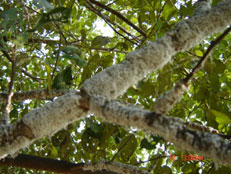
Keeping in view the availability of lac host plants (Palash, Ber, Semialata etc) in abundance in Adhaura block, it was found befitting to promote lac cultivation for tribal youth. 20 tribal youths from remote villages have initially been selected and imparted training on cultivation and semi-processing. Lac cultivation being a low cost, less time consuming and profitable enterprise attracted the tribal youth. To start with, we provided brood lac (lac seed) to selected farmers free of cost under demonstration programme. After 1st year of introduction, number of lac cultivators increased gradually. At present around 35-40 youths are engaged in lac cultivation. Earning from lac production support the family income of tribal populate. At present status of lac cultivation is depicted below :
| S.N. | Name of Village | No. of Farmers Engaged in Lac Cultivation | Average Annual Production (Qtl.) | Average Annual Income (Net of Expenditure per Farmer ) Rs. |
|---|---|---|---|---|
| 1 | Kon Bhabhani | 25 | 32 | 2,450 |
| 2 | Sarodag | 12 | 18 | 3,100 |
With the help of Indian Lac Research Institute, Namkum, KVK not only help in marketing of lac but also update the knowledge and skill of cultivators from time to time. It is now become a popular enterprise among Tribal Youth.
ii) Niger Cultivation
Plateau region of Kaimur district is most suitable for Niger cultivation. KVK conducted demonstration in 60 ha from 2012-13 to 2017-18 at farmers field to encourage farmers for cultivation of Niger. It was not a popular enterprise before intervention of KVK. We demonstrated scientific method of Niger production which followed by a large number of farmers. It helped in increase of per hectare average yield resulting in to additional earning
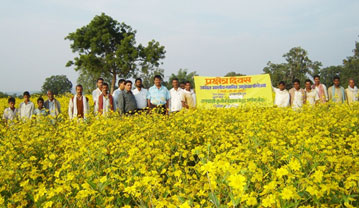
Impact of Niger Cultivation
| Before Intervention of KVK | After Intervention of KVK | % Increase in Areas | % Increase in Yield |
|---|---|---|---|
| Area under Niger cultivation : 25 Average yield per hectare : 3.15 Average income per ha. : 12,600 |
Area under Niger cultivation : 85 Average yield per hectare : 4.10 Average income per ha : 16,400 |
141.66 | 30.16 |
iii) Natural Farming
Natural Farming technology/practice has not yet been formally introduced in India. It is a technology in which boiled rice, jaggery, spoiled egg, perished fish and fruits, Garlic and other food items/kitchen waste are used for preparation of plant nutrient, growth regulator and plant protection material. The process is low cost compared to application of chemical fertilizer/pesticide. For comparison purpose, we take one crop (Maize):
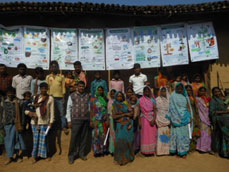
Comparison of the economics between conventional and natural farming in maize crop
| S.N. | Particulars | Qty | Rate | Amount (Rs.) |
|---|---|---|---|---|
| 1 | Natural Farming : Conventional Farming : |
|||
| a) | Seed | 20 Kg | 60/Kg | Natural Farming : 1,200 Conventional Farming : 1,200 |
| b) | Materials (Other than seed)-Rice, Rice bran, Jaggery, Bottles, Knife etc. | Total inputs | 1,200 | Natural Farming : 1,200 Conventional Farming : - |
| c) | NPK (100:60:50) i) DAP ii) Urea iii) Potash |
130 Kg 150 Kg 80 Kg |
10/Kg 6/Kg 6/Kg |
Natural Farming : - - - Conventional Farming : 1,300 900 480 |
| d) | Plant Protection Furodon-3G |
20 Kg |
50/ Kg |
Natural Farming : - Conventional Farming : 1000 |
| e) | Labour (For sowing, mulching, fertilizer application, weeding, harvesting & marketing etc) | 250 mandays 350 mandays |
150/ manday 150/ manday |
Natural Farming : 37,500, - Conventional Farming : -, 52,500 |
| 2 | Natural Farming : Conventional Farming : |
|||
| a) | Green Cob | 125 Qtls 130 Qtls |
600/Qtl 600/Qtl |
Natural Farming : 75,000, - Conventional Farming : - , 78,000 |
| b) | Green Fodder | 300 Qtls | 50/Qtl | Natural Farming : 15,000 Conventional Farming : 15,000 |
| GROSS INCOME | - | - | Natural Farming : 90,000 Conventional Farming : 93,000 |
|
| 3 | Net Profit | - | - | Natural Farming : 50,100 Conventional Farming : 35,620 |
| 4 | Cost of production (Rs./Qtl) | - | - | Natural Farming : 319.20 Conventional Farming : 441.30 |
| 5 | CB Ratio | - | - | Natural Farming : 2.25 Conventional Farming : 1.62 |
iv) Vaccination and Artificial insemination
Plateau region has a large number of cattle of old traditional breeds. Therefore yield of milk is far below the potential yield. The other important fact observed was ailing/mortality rate in cattle which is alarming. In order to redress these problems KVK went in to a tripartite agreement with Forest Deptt. and Animal Husbandry Deptt. of state government for initiating a campaign for vaccination and artificial insemination for improvement in Breed. Vaccines and frozen semen have been supplied by Animal Husbandry and Forest Departments respectively. KVK provided technical support. Veterinarian of KVK closely monitored the campaign and visited almost all clusters to help vaccinations.
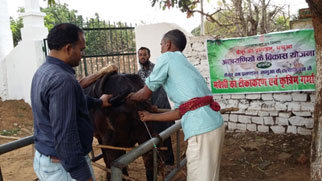
Data of vaccination and artificial insemination is presented below
| No. of Villages | No. of Cattle |
|---|---|
| Jharpa | Vaccinated : 60 Artificially Inseminated : 04 |
| Panchmahul | Vaccinated : 75 Artificially Inseminated : 13 |
| Karar | Vaccinated : 115 Artificially Inseminated : 06 |
| Bharehara | Vaccinated : 82 Artificially Inseminated : 03 |
| Adhaura | Vaccinated : 162 Artificially Inseminated : 05 |
| Chainpura | Vaccinated : 145 Artificially Inseminated : 09 |
| Khamkala | Vaccinated : 90 Artificially Inseminated : 13 |
The programme has been carried on for last two year. Result of vaccination is overwhelming. Ailing/mortality rate reduced up to 30%. As regards improvement of breed the status is not yet very clear but expected good result.
Year : 2015-16
i) Para-vet
During 2015-16 20 no. of rural youths having qualification up to Matriculation level have been trained at KVK in vaccination, and taking care of ailing cattle and other domestic animals. Apart from taking care of their animals, these youths earn around Rs. 2,500-3,000 per month from this activity. However, Trainees have been cautioned not to take up serious cases but to report immediately to KVK for specialized treatment by qualified professional.
ii) Natural Poultry / Pig Farming
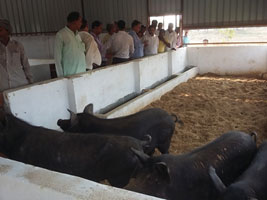
Natural poultry and pig farming have been introduced in tribal dominated Bharehara and Panchmahul villages of Adhaura block.
Natural farming is based on the function of beneficial microbes which recycle the waste and remove bad odour. Microbes help in gaining weight and also keep birds / pigs healthy and reproductive. This is low cost technology and easy in practice.
In comparison to conventional practice, natural farming increases yield on an average 20-25% which increases farmers’ income.
iii) Fodder Production
During summer there has been scarce of fodder for animals. KVK introduced cultivation of Napier grass to cater the need of fodder to some extent. We supplied slips to 30 farmers for 3 ha area. Now area expanded to around 5 ha.
Napier grass is a perennial crop which needs small amount of water to grow. It has also nutritional value and also contains vitamin and minerals suitable for cattle.
iv) Tailoring and Embroidery
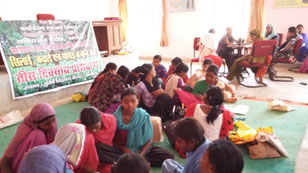
We have been conducting training on tailoring and embroidery for adolescent girls for last two years. A total of 55 girls from 15 villages have been trained. This training helps them in catering the general tailoring need of the family. Some of the girls made it a part time profession and earn Rs. 1500-2000 per month.
Year : 2016-17
i) Mali Training
With the increasing demand of fruits and flowers it is pertinent that farmers must have detail knowledge of orchard maintenance, budding, grafting etc. and floriculture practices for keeping pace with the demand.
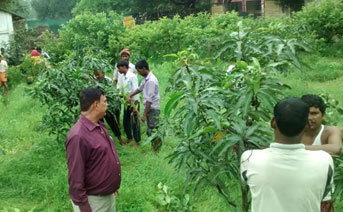
Based on the above, we conducted ‘ Mali’ (Gardner) training for 18 selected rural youths. After training, some of the Trainees started their own nursery and some have been offered employment. This helps reducing unemployment in rural youth.
ii) Mushroom cultivation
KVK has imparted training to 130 farmers (under different sponsorship) for mushroom cultivation. After training a group of farmers of village Thakura under Ramgarh block has been doing commercial cultivation of mushroom. They earn around 10-12 thousand per head per month. This success inspired many other farmers to join the group.
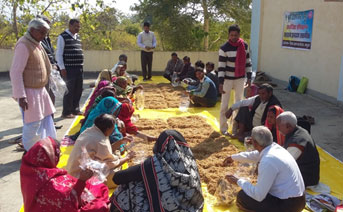
In order to organize this venture at commercial basis we are under process to form Farmer Producer Organisation (FPO). This will help farmers to grow more for large scale business.
Year : 2017-18
i) Fasal Surksha Mitra ( ??? ??????? ????? )
Disease and Pest damage crops to a considerable extent. Farmers normally can not diagnose correctly to treat and prevent. This is a widespread problem which badly affects the yield.
To redress this problem, we selected two enthusiastic youths from all eleven blocks (total 22) and imparted them extensive training on plant protection measures. These youths are named as “Fasal Suraksha Mitra”. They help farmers of their locality in diagnosis and treatment of crop infected with disease / pest. Farmers pay mutually agreed fee for their services. This becomes a livelihood option for youths. In current year we envisage to conduct one more training programme for another 22 youths.
ii) Kisan club
KVK has formed 15 Kisan clubs for fast dissemination of technology. Kisan clubs are affiliated with NABARD for financial support. KVK provides clubs community input like sprayer, pumping set, winnowing fan etc. In turn club provides it to its members at a nominal charge for maintenance. KVK also provide leaflets, hand books and agriculture related literatures to clubs.







